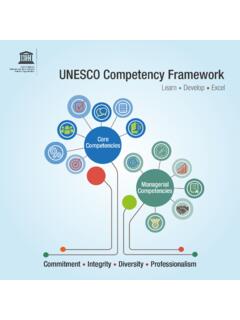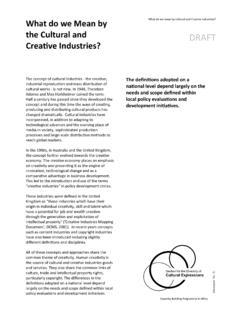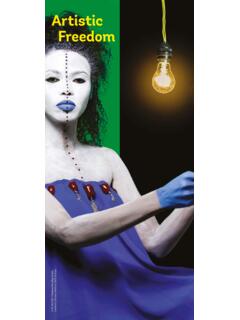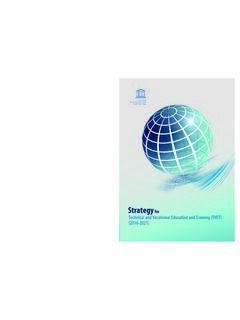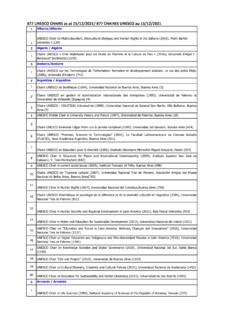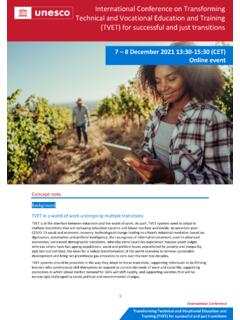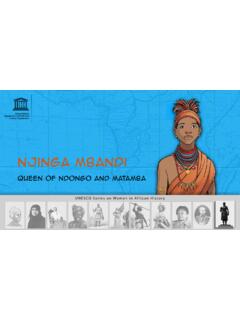Transcription of Education in a Post-COVID World-Nine Ideas for Public Action
1 United NationsEducational, Scientific andCultural OrganizationEducation in a Post-COVID world:Nine Ideas for Public Action International Commission on the Futures of EducationUNESCO Education SectorEducation is UNESCO s top priority because it is a basic human right and the foundation on which to build peace and drive sustainable development. UNESCO is the United Nations specialized agency for Education and the Education Sector provides global and regional leadership in Education , strengthens national Education systems and responds to contemporary global challenges through Education with a special focus on gender equality and of Education : Learning to becomeThe International Commission on the Futures of Education was established by UNESCO in 2019 to reimagine how knowledge and learning can shape the future of humanity and the planet. The initiative incorporates extensive Public and expert engagement and aims to catalyze a global debate on how Education needs to be rethought in a world of increasing complexity, uncertainty, and fragility.
2 Published in 2020 by the United Nations educational , scienti c and cultural organization , 7, place de Fontenoy, 75352 Paris 07 SP, France UNESCO 2020 This publication is available in Open Access under the Attribution-ShareAlike IGO (CC-BY-SA IGO) license (http:// ). By using the content of this publication, the users accept to be bound by the terms of use of the UNESCO Open Access Repository ( ). The designations employed and the presentation of material throughout this publication do not imply the expression of any opinion whatsoever on the part of UNESCO concerning the legal status of any country, territory, city or area or of its authorities, or concerning the delimitation of its frontiers or boundaries. The members of the International Commission on the Futures of Education are responsible for the choice and the presentation of the material contained in the publication and for the opinions expressed therein.
3 These are not necessarily those of UNESCO and do not commit the organization . This publication can be referenced as: International Commission on the Futures of Education . 2020. Education in a Post-COVID world: Nine Ideas for Public Action . Paris, UNESCOC over photo credit: Jacob_09 , and credit of the members of the International Commission: @Fabrice GentileDesigned and printed by UNESCO Printed in FranceED-2020/FoE- covid -19/2 International Commission on the Futures of EducationNine Ideas for Public actionEducation in a Post-COVID worldH. E. Ms Sahle-Work ZewdeChair, International CommissionMasanori Aoyagi Arjun AppaduraiPatrick AwuahAbdelbasset Ben Hassen Cristovam BuarqueElisa GuerraBadr JafarDoh-Yeon KimJustin Yifu LinEvgeny MorozovKaren MundyAnt nio N voaNgozi Okonjo-IwealaFernando M. ReimersTarcila Rivera Zea Serigne Mbaye Thiam Vaira Vike-Freiberga Maha YahyaInternational Commission on the Futures of EducationNine Ideas for Public action3 PREFACEThe global health pandemic has shined a harsh light on the vulnerabilities and challenges humanity faces.
4 It has provided a clear picture of existing inequalities and a clearer picture of what steps forward we need to take, chief among them addressing the Education of more than billion students whose learning has been hampered due to school closures. This report is the result of the collective work of the International Commission on the Futures of Education , established by UNESCO in 2019. I would like to acknowledge the Members of the Commission for contributing to the timely preparation of this presents nine key Ideas for navigating through the covid -19 crisis and its aftermath, contending that we cannot forget core principles and known strengths as we face unprecedented disruption to economies, societies and our particular focus here Education is evident that we cannot return to the world as it was before. One of the strongest messages in the attached report is that our common humanity necessitates global solidarity.
5 We cannot accept the levels of inequality that have been permitted to emerge on our shared planet. It is particularly important that the world supports developing countries with investment in 21st century Education infrastructures; this will require the mobilization of resources and support from developed countries, in particular with debt cancellation, restructuring, and new financing. The magnitude of this challenge is clearly evident with regard to the digital divide in Africa. For example, only 11% of learners in sub-Saharan Africa have a household computer and only 18% have household internet, as compared to the 50% of learners globally who have computers in the home and the 57% who have access to internet. Already we see that the disruptions brought on by the pandemic are exacerbating inequalities both within and across countries. We urgently need investment and structural change so that short-term setbacks do not grow into larger, long-lasting is a serious risk that covid -19 will wipe out several decades of progress most notably the progress that has been made in addressing poverty and gender equality.
6 While the pandemic demonstrates that we belong to one interconnected humanity, social Education in a Post-COVID world4and economic arrangements mean that the impacts of the virus are disparate and unjust. Gender discrimination means that girls educational attainments are likely to suffer greatly, with a risk of many not returning to school Post-COVID -19. This is not something we should accept; we must do everything in our power to prevent has the potential to radically reshape our world, but we must not passively sit back and observe what plays out. Now is the time for Public deliberation and democratic accountability. Now is the time for intelligent collective Excellency Sahle-Work ZewdePresident of the Federal Democratic Republic of EthiopiaChair of the International Commission on the Futures of EducationNine Ideas for Public action5 EXECUTIVE SUMMARY Decisions made today in the context of covid -19 will have long-term consequences for the futures of Education .
7 Policy-makers, educators and communities must make high-stakes choices today these decisions should be guided by shared principles and visions of desirable collective futures. covid -19 has revealed vulnerabilities; it has also surfaced extraordinary human resourcefulness and potential. This is a time for pragmatism and quick Action , but it is also a moment when more than ever we cannot abandon scientific evidence. Nor can we operate without principles. Choices must be based on a humanistic vision of Education and development and human rights frameworks. The 2030 Agenda for Sustainable Development provides many of the necessary signposts and guidelines. In this report, the International Commission on the Futures of Education established by UNESCO in 2019 and composed of thought leaders from the worlds of academia, science, government, business and Education presents nine Ideas for concrete actions today that will advance Education tomorrow.
8 1. Commit to strengthen Education as a common good. Education is a bulwark againstinequalities. In Education as in health, we are safe when everybody is safe; we flourish when everybody flourishes. 2. Expand the definition of the right to Education so that it addresses the importanceof connectivity and access to knowledge and information. The Commission calls for a global Public discussion that includes, among others, learners of all ages on ways the right to Education needs to be Value the teaching profession and teacher collaboration. There has beenremarkable innovation in the responses of educators to the covid -19 crisis, with those systems most engaged with families and communities showing the most resilience. We must encourage conditions that give frontline educators autonomy and flexibility to act in a Post-COVID world6 We cannot return tothe world as it was before 4.
9 Promote student, youth and children s participation and rights. Intergenerationaljustice and democratic principles should compel us to prioritize the participation of students and young people broadly in the co-construction of desirable change. 5. Protect the social spaces provided by schools as we transform Education . The schoolas a physical space is indispensable. Traditional classroom organization must give way to a variety of ways of doing school but the school as a separate space-time of collective living, specific and different from other spaces of learning must be Make free and open source technologies available to teachers and educational resources and open access digital tools must be supported. Education cannot thrive with ready-made content built outside of the pedagogical space and outside of human relationships between teachers and students.
10 Nor can Education be dependent on digital platforms controlled by private Ensure scientific literacy within the curriculum. This is the right time for deepreflection on curriculum, particularly as we struggle against the denial of scientific knowledge and actively fight Protect domestic and international financing of Public Education . The pandemic has the power to undermine several decades of advances. National governments, international organizations, and all Education and development partners must recognize the need to strengthen Public health and social services but simultaneously mobilize around the protection of Public Education and its Advance global solidarity to end current levels of inequality. covid -19 has shownus the extent to which our societies exploit power imbalances and our global system exploits inequalities. The Commission calls for renewed commitments to international cooperation and multilateralism, together with a revitalized global solidarity that has empathy and an appreciation of our common humanity at its presents us with a real challenge and a real responsibility.
